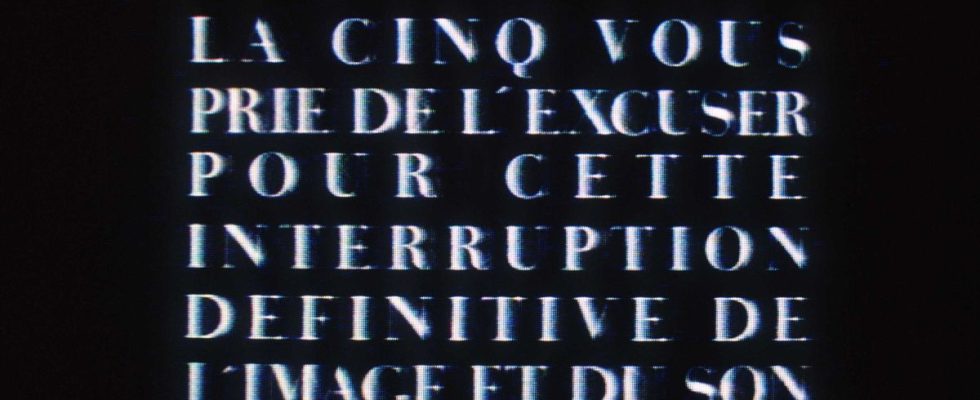If she did not necessarily have everything to please, she at least had all the assets to shake up the French PAF, the Five. Cult cartoons, American series, diaries of Jean-Claude Bourret, friend of extraterrestrials and sexy dancers from Collaro. Launched in 1986 on the airwaves, France’s first free private channel shattered the codes in a dazzling way to end, seven years later, in a resounding failure. Behind this fiasco we find Silvio Berlusconi, the Italian businessman and politician, who died on Monday at the age of 86.
La Cinq was born in February 1986, at the instigation of President François Mitterrand. He is in favor of the creation of the first free private channel in France, after the successful launch of a paying one, Canal+, in 1984. The industrialist Jérôme Seydoux and the pioneer of private television in Italy, Silvio Berlusconi, are chosen at the end of a call for tenders criticized by the partisans of a television with cultural dominance.
“It was the side of champagne and dancing girls”
On the contrary, La Cinq is inspired by Canale Cinque, Berlusconi’s Italian flagship, popular trend and glitter. “He had created an Italian-style channel, with sequins, it was the champagne side and the girls who dance”, remembers for AFP Jean-Claude Bourret, passed on the Five in 1987 after having been one star presenters from TF1.
The programming, ultra-generalist, mixes entertainment, American series (K2000, supercopter…), films for the general public and figures from French TV (Christian Morin, Roger Zabel, Alain Gillot-Pétré…) or Italian (Amanda Lear who presents the game Look for the woman).
Berlusconi, “he was an extraordinary seducer, a clever one”, smiles Jean-Claude Bourret, telling how the magnate boasted of rigging the Italian ratings. According to him, the businessman ensured paying new televisions to homes in which the audience was measured, asking them to leave the old one permanently connected to Canale Cinque.
Hersant and the manga enter the dance
But the French adventure quickly becomes complicated. Jacques Chirac, who became Prime Minister in March 1986, privatized TF1 and terminated the La Cinq concession. In 1987, a new channel of the same name succeeded it, led by Robert Hersant, still in tandem with Berlusconi. The flamboyant Italian and the dreaded French press boss “got along pretty well”, recalls Jean-Claude Bourret, who joined the channel at that time.
The new Five version is gradually gaining a place in the ratings, even if it is not received in certain parts of the territory. In addition to series, it broadcasts Japanese cartoons that have become cults (Olive and Tom, Joan and Serge, Princess Sarah), which rub shoulders with the programs of Stéphane Collaro and his “cocogirls” in sexy outfits (collaricocoshow, Mondo Goofy). On the news side, Jean-Claude Bourret presents the JT and creates new formats, such as interactive Duel on the Fivewhere two guests who are debating are then separated by a telephone survey.
But the audience of La Cinq, which peaked at 13% in 1989, was too low to make profitable a channel entirely financed by advertising and which had spent a lot to recruit presenters. It accumulates deficits and receives fines for broadcasting violent programs or non-compliance with broadcasting quotas.
The bet on quality does not work
The shareholders divided and Hersant threw in the towel in 1990. The CSA designated the Hachette group, headed by Jean-Luc Lagardère, who dreamed of going into television, to manage the channel. If Berlusconi remains a shareholder, he is however deprived of any operational role.
The ambition of Lagardère, which tries to bet on quality, comes up against economic reality. The losses widened and the judicial liquidation of the chain, which employed 900 people, was pronounced in 1992. At the time, its declared liabilities approached four billion francs (or 60 million euros). La Cinq therefore ceased broadcasting on April 12, 1992, despite a popular support movement formed around the “Association for the Defense of La Cinq”, founded by Jean-Claude Bourret. That day, it was he who pronounced the final countdown live, in the middle of the staff: “In a few seconds, the Five will die. I remind you that the fight is only beginning again”, he said. The disappearance of the Five leads to heated debates on the granting of its frequency. The government will quickly preempt it to launch the Franco-German channel Arte.

